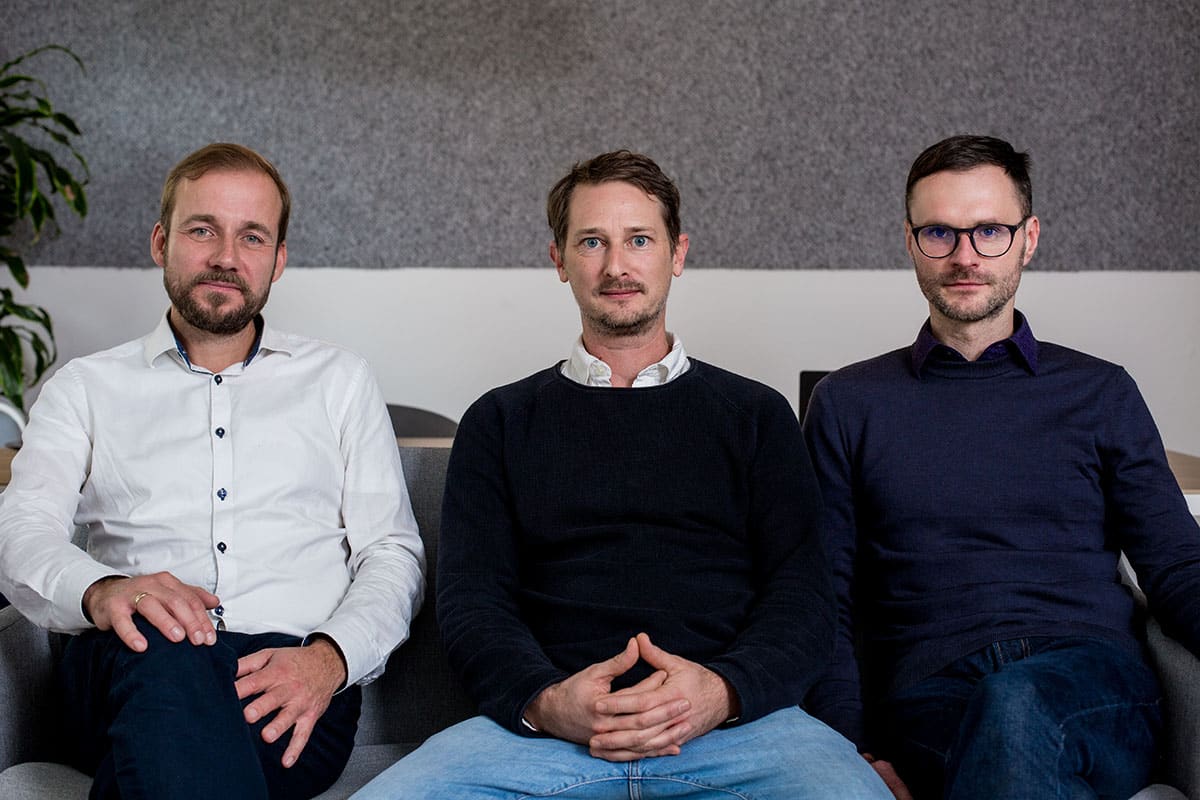
v.l.: die Katana Labs Gründer Nicolaus Widera, Dr. Walter de Back und Dr. Falk Zakrzewski
Dem Krebs auf der Spur – Software von Katana Labs erkennt Krebszellen mit Künstlicher Intelligenz
TGFS
08. November 2023
Zeit ist Geld, sagt der Volksmund. Doch Zeit ist so viel wertvoller als Geld, wenn die Gesundheit eines Menschen auf dem Spiel steht. Das zeigt sich besonders drastisch bei Krebskrankheiten, die laut Statistischem Bundesamt die häufigste Todesursache in der Altersgruppe der 40- bis 79-Jährigen bilden. Für eine erfolgreiche Prävention und Therapie von Krebserkrankungen ist jeder einzelne Tag entscheidend: Umso früher die Diagnose, umso höher die Heilungschancen. Doch dem stehen vielerorts überlastete Labore entgegen, in denen Gewebeproben bis heute weitestgehend manuell auf Krebsbefall hin untersucht werden. Infolge des Fachkräftemangels kommen die Pathologinnen und Pathologen kaum noch mit der zeitintensiven Analyse am Mikroskop hinterher. Das Start-up Katana Labs aus Dresden ist angetreten, dieses Dilemma mit Spitzentechnologie „made in Saxony“ zu überwinden: Forschungsprojekte am Carl Gustav Carus Universitätsklinikum Dresden legten den Grundstein für die cloudbasierte Software PAIKON. Ausgestattet mit Künstlicher Intelligenz erlaubt sie eine schnellere, präzisere und umfassendere Analyse von Gewebeproben, als es dem Menschen möglich ist. Damit die Analyse-Software weiterentwickelt, zertifiziert und in Laboren weltweit Anwendung finden kann, investierte der now jetzt schon in der Pre-Seed-Phase in Katana Labs. Denn eine frühzeitige Unterstützung ist auch im Start-up-Funding erfolgskritisch. Realisiert wird das Investment von der MBG als Management-Partner im TGFS.
Das Gründerteam von Katana Labs – bestehend aus Dr. Falk Zakrzewski, Nicolaus Widera und Dr. Walter de Back – arbeitet an der TU Dresden und dem Carl Gustav Carus Universitätsklinikum Dresden schon seit einigen Jahren gemeinsam an digitalen Pathologielösungen. Dabei haben sie auch einen persönlichen Transformationsprozess von Wissenschaftlern hin zu Unternehmern vollzogen. Mit der Etablierung von Katana Labs im Mai dieses Jahres konzentrieren sich die Gründer nun in Vollzeit auf die Entwicklung und Vermarktung der PAIKON Software. Warum die Zeit auch hier ein entscheidender Faktor ist, erklärt Co-Gründer Dr. Falk Zakrzewski: „Der Markt der KI-gestützten Krebsdiagnostik bildet sich gerade erst heraus. Wir gehören mit unserer Technologie zu den Pionieren und haben die Chance, hier in Sachsen ein Vorzeigeprojekt zu etablieren. Das Risikokapital des TGFS hilft uns sehr, die Produktentwicklung voranzutreiben und den internationalen Anschluss nicht zu verlieren.“ Zugleich bewertet er das TGFS-Investment als eine „vertrauensbildende Maßnahme, die uns attraktiver für andere Kapitalgeber macht.“ Der TGFS hatte Katana Labs schon seit 2021 beobachtet, bevor er jetzt als erster institutioneller Kapitalgeber einstieg. Der zuständige Investment-Manager Christian John erläutert: „Ausschlaggebende Faktoren für unser Engagement war die hohe Fachkompetenz im Team, was sowohl den medizinischen Bereich als auch die Fähigkeiten im Bereich Künstlicher Intelligenz betrifft. Mit PAIKON legen sie eine marktreife Software vor, die die Arbeit in der Pathologie auf ein neues technologisches Niveau heben und langfristig viele Leben retten kann.“ Neben dem TGFS hatten sich vier Business Angels aus dem In- und Ausland an der Finanzierungsrunde beteiligt – darunter ausgewiesene Fachexpertinnen und ‑experten.
Die PAIKON Softwarelösung wurde in engem Austausch mit praktizierenden Pathologinnen und Pathologen entwickelt, um deren Arbeitsrealität gerecht zu werden. Wie der gesamte Medizinsektor leidet auch die Pathologie unter rückläufigen Personalzahlen – gleichzeitig steigen die Zahlen der zu untersuchenden Gewebeproben mit einer wachsenden, alternden Weltbevölkerung und verbesserten medizinischen Versorgungssituation global an. Die Automatisierungslösung von Katana Labs verspricht die dringend erforderliche Produktivitätssteigerung. Dazu werden die Gewebeproben zuerst von speziellen Scannern in digitale, hochaufgelöste Bilder mit bis zu 150.000 mal 150.000 Pixeln umgewandelt. Diese digitalen Abbilder scannt PAIKON dann auf Krebs- und weitere Biomarker hin. Dank Künstlicher Intelligenz, die mit beispielhaften Gewebeproben trainiert wird, werden binnen weniger Minuten bis zu einer Million Zellkerne ausgezählt und unter die digitale Lupe genommen. Die computergenerierten Analysen liefern eine schnelle, zuverlässige Entscheidungsgrundlage für die medizinischen Fachkräfte, die dann die eigentliche Diagnose stellen. Zu Beginn fokussierte sich Katana Labs auf die molekulare Charakterisierung von Brustkrebs, der häufig mit der sogenannten HER2-FISH Analysemethode diagnostiziert wird. Dieses Verfahren arbeitet zwar sehr genau, ist aber zugleich extrem zeit- und kostenintensiv. Daher sind die Einsparpotenziale durch PAIKON hier besonders hoch. Parallel entwickelt Katana Labs die Software bereits weiter, um zusätzliche Analysemethoden abbilden und weitere Krebsarten aufdecken zu können. Bei der Produktdiversifikation liegt das Augenmerk aktuell auf der Diagnose von Darm‑, Prostata- und Lungenkrebs, die ebenfalls hohe Fallzahlen aufweisen.
In der Vergangenheit konnte das Team von und um Katana Labs schon mehrfach staatliche Fördergelder für die Forschung einwerben. Damit der Übergang vom Forschungsprojekt zum Business Case gelingt, braucht es aber auch langfristige Perspektiven, wie Dr. Falk Zakrzewski festhält: „Der Forschungsbereich wird traditionell stark gefördert, aber noch zu häufig wandern die Fachkräfte und mit ihnen neue Technologien aus Sachsen ab.“ Vor diesem Hintergrund bewertet der Gründer den TGFS als wichtigen Standortfaktor. „Der TGFS bildet das Bindeglied, um die aus den geförderten Forschungsprojekten erwachsenden Unternehmen in Sachsen weiterzuentwickeln, zu halten und das Geld wieder in den Freistaat zurückfließen zu lassen. Durch das Kapital aus dem TGFS können Unternehmen in Sachsen wachsen und hier in Personal investieren.“ Katana Labs ist in den letzten Monaten bereits auf sieben Festangestellte angewachsen. Die neu gewonnenen Finanzmittel werden aber auch darauf verwendet, den Zertifizierungsprozess für die PAIKON Software voranzutreiben. Um die strengen Anforderungen an die Zulassung von digitalen Medizinprodukten zu erfüllen, baut Katana Labs ein Qualitätsmanagementsystem, eine technische Dokumentation und ein internes Risikomanagement auf. Ziel ist es, für die Brustkrebsdiagnose-Software bis 2024 eine CE-IVD-Zertifizierung zu erhalten. Damit kann PAIKON an pathologische Labore und Kliniken in der EU vertrieben werden. Eine potentielle Zertifizierung durch das FDA soll den Zugang zum US-Klinikmarkt eröffnen. Für reine Forschungszwecke darf die Software auch ohne Zertifizierung verwendet werden. Bei forschenden Pharma- und MedTech-Unternehmen ist sie bereits im kommerziellen Einsatz. Auf diese Weise trägt Katana Labs schon heute dazu bei, neue Analysemethoden und Medikamente für Krebserkrankungen zu entwickeln. Denn auch hier zählt jeder Tag, um Menschenleben zu retten.
Deal team TGFS
Tobias Voigt and Christian John
The article was published by the MBG Sachsen — management partner in TGFS.
Bildquelle: Katana Labs GmbH
